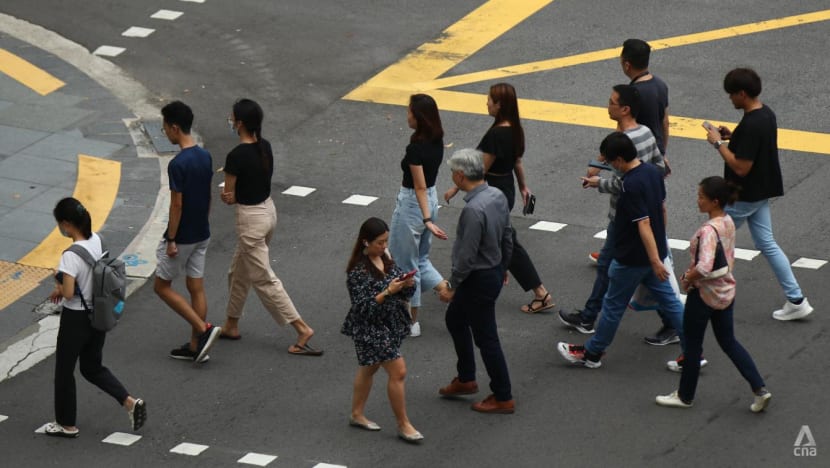CNA Explains: Trump's tariff turmoil – what options does Singapore have?
Trade-reliant Singapore is expected to suffer if the global economy slows down.

File photo of people crossing the street at the central business district (CBD) in Singapore. (Photo: CNA/Syamil Sapari)

This audio is generated by an AI tool.
SINGAPORE: At midnight on Wednesday (Apr 9), steep tariffs on “nations that treat (the United States) badly” went into effect. In Asia, major stock indexes sank.
But less than 24 hours later, President Donald Trump announced a 90-day pause, bringing tariffs back to a 10 per cent baseline for all countries, except China.
Tariffs on Chinese goods shot up to 125 per cent.
These moves, along with the all-round volatility that's marked the Trump administration, are expected to cause a decline in global commerce.
That’s bad news for trade-reliant Singapore, which earlier this week announced a national task force to help businesses and workers deal with any fallout.
Can Singapore use its currency as a tool against tariffs?
Singapore’s central bank manages monetary policy by controlling the strength or weakness of the local dollar, against the currencies of main trading partners.
If the Monetary Authority of Singapore (MAS) sets a “less steep appreciation stance” on the Singapore dollar, exporters could get a bit of a breather, said Ms Selena Ling, chief economist at OCBC.
Goods from Singapore being sold to other countries would then be cheaper, since the same amount of foreign currency would be worth more Singapore dollars.
Ms Ling said it appeared likely that the MAS would ease policy the coming Monday (Apr 14), when the central bank is due to release its quarterly monetary policy statement.
“The question is how much easing … flatten slope or do more?” she said, referring to the slope of the Singapore dollar nominal effective exchange rate (S$NEER) policy band.
Nine out of 10 analysts polled by Reuters expect an easing of policy.
This runs the risk, however, of "drawing the US' ire", said Ms Ling, noting increased scrutiny from Washington across tariffs, non-tariff measures and currency alike.
The US has previously criticised China for weakening its currency to offset tariffs.
There's also the possibility that looser economic policy leads to inflation, said Singapore Management University (SMU) assistant professor of economics Yuan Mei.
“MAS needs to keep a delicate balance when easing its monetary policy,” he said.
What about fiscal measures?
Increased government spending on public services, and subsidies for businesses and households, can significantly help in stabilising the economy, said Assistant Professor Ye Guangzhi from the Nanyang Technological University’s (NTU) economics department.
Short-term measures such as corporate income tax rebates can help businesses overcome issues caused by global trade disruptions, while Community Development Council (CDC) cash vouchers can help households offset the rising cost of living, he added.
“These policy tools are already (being used) by the Singaporean government and will remain useful for handling the recent challenges,” said Asst Prof Ye.
Asst Prof Mei also highlighted the CDC vouchers as a way to provide immediate support. But he doesn't see the need to change Singapore’s fiscal policy drastically at the moment.
Ms Ling of OCBC said an “expansionary fiscal stance” where the government spends more would mitigate the tariff shockwave.
Singapore’s government could consider an additional Budget package if downside growth risks become a reality, she suggested.
What else can Singapore do?
Trading with the US has become more difficult under Trump’s leadership, Asst Prof Mei pointed out.
“Singapore should be prepared for a trade network without the US,” he said, adding that the country should work together with major economies such as the European Union and China to defend the World Trade Organization framework.
Ms Ling said Singapore should still increase engagement and negotiation with the US, while strengthening economic partnerships outside the US.
Southeast Asian nations need to be more united; and Singapore needs to improve its domestic ecosystem so that it's competitive when it comes to productivity, innovation, research and development and more, she said.
“(The) national approach has to be one of remaining trade- and market-friendly; staying open for business and talent; (and) sticking to a global or multi-lateral economic framework.”
NTU's Asst Prof Ye said that while fiscal and monetary policies can mitigate short-term fluctuations, regional cooperation and developing comparative advantages would be most important and effective.
“They offer greater resilience, a more sustained long-term impact and more fundamental improvements in addressing the uncertainties of global trade."
Investing in human capital and upgrading workforce skills will help in adapting and seizing growth opportunities in the digital economy, he added.
“These advantages are suitable for a small advanced economy like Singapore to develop."
















